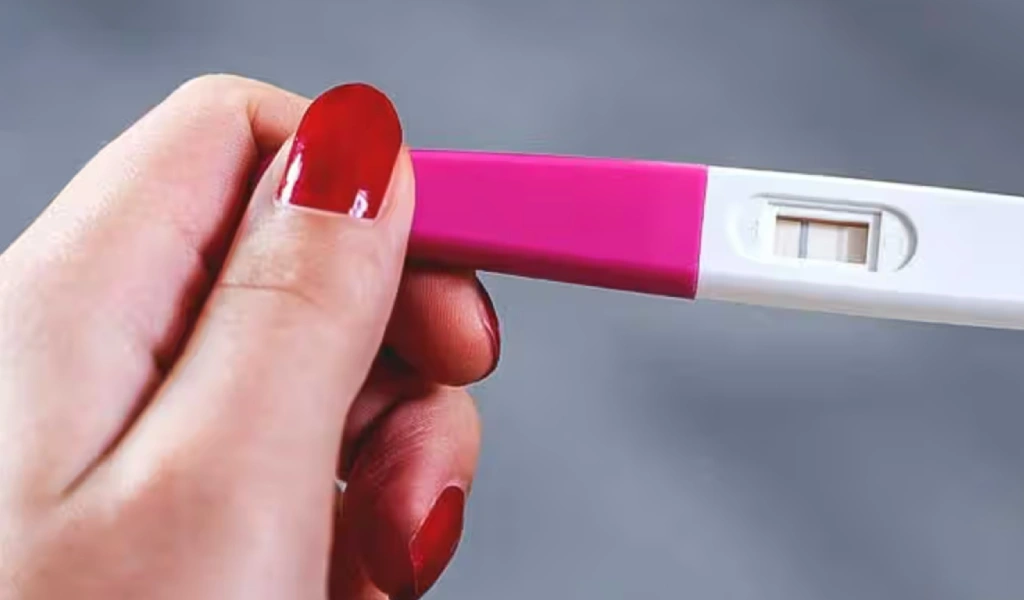Ovulation, premenstrual syndrome (PMS), and pseudocyesis can lead to the manifestation of symptoms similar to those of pregnancy symptoms. It can be disheartening for women attempting to get pregnant when they experience pregnancy symptoms despite receiving negative pregnancy test results. Pregnancy tests typically involve examining blood or urine samples for the presence of the human chorionic gonadotropin (hCG) hormone.1
Various home pregnancy tests are designed to identify the presence of hCG in urine. Levels of hCG typically rise in both blood and urine during the first trimester. Despite their purpose, these tests are not always accurate and can sometimes yield incorrect results, indicating either a negative or positive pregnancy.2
Continue reading ‘Can pregnancy symptoms be present even with negative test results?‘ to discover the potential explanations for getting a negative outcome on a pregnancy test despite experiencing pregnancy symptoms.
Pregnancy can occur even if tests show up negative and pregnancy symptoms persist
Urine pregnancy tests can sometimes give inaccurate results, meaning they may indicate that you are not pregnant when you are. This can occur for a variety of reasons, including.
1. Getting the pregnancy test done at an early stage of pregnancy
The level of hCG rises as the pregnancy continues and may require some time to reach a detectable level on a pregnancy test. Therefore, if the pregnancy test is done too early, the pregnancy test kit might not be able to detect low hormone levels and give a negative pregnancy result. If this happens, it is advisable to retest after a week. 3
Some pregnancy testing kits may advise you to perform the test on the anticipated start day of your period, but the FDA recommends waiting one to two weeks after a missed period for the most accurate pregnancy results.4
A mother tells her experience of receiving a false negative pregnancy test because she tested too early, even before her expected period.
“When I became pregnant with my first child, I had a feeling that I might be expecting. So, I opted for a pregnancy test. Upon conducting the test, the lab technician informed me that the result was negative. However, I could tell from his expression that he wasn’t entirely certain. As my period approached, I experienced menstrual-like cramps for several days without actually getting my period. Eventually, when it did arrive, it was not as heavy as usual. I later learned that this was implantation bleeding. Feeling a bit anxious, I decided to consult my gynecologist. Following a review of my medical history, the gynecologist instructed me to lie down for a physical examination. To my astonishment, I received the surprising news that I was two months pregnant.”
2. When the levels of hormones are below the detectable threshold
There could be specific reasons why the hCG hormone levels are low during the test.
- The levels of hCG can vary naturally in women with normal pregnancies, with peak and low levels occurring at different times.5
- Sometimes, there may be a lack of precision in predicting the expected day of the next menstrual period, leading to low hCG levels during testing.
- Testing later in the day could also impact hormone concentration due to water intake.
3. Sample that has been made less concentrated
Using the first urine of the day is recommended for the pregnancy test, as it is believed to contain the highest amount of hCG.6 Consuming a large amount of water before the pregnancy test or the night before could potentially weaken the urine sample, causing the hCG levels to fall below the detectable range of the test.7
4. The pregnancy test was not taken promptly
If the pregnancy test is not taken on time, certain circumstances may occur.
- The typical way a positive test works is by binding free antibodies, fixed antibodies, and hCG molecules together.
- When hCG levels are extremely high, they can overwhelm the antibodies and prevent the formation of the sandwich structure, leading to a false negative result known as the hook effect.8
- Various forms of hCG may appear later in pregnancy, and certain tests may not be able to detect them, resulting in a negative result.9
5. Incorrect techniques or a defective testing kit
Most home pregnancy tests follow the same steps, but it is crucial to read the instructions thoroughly before taking the pregnancy test to prevent mistakes. Not following the instructions could cause incorrect pregnancy results.
Defective tests may result from manufacturing problems or improper storage. Using an expired pregnancy test kit may not provide accurate results, so it is essential to use a new kit.
Pregnancy symptoms can be present even when a pregnancy test comes back negative
Not every fertilized egg will lead to a successful pregnancy and it could be linked to medical issues like abnormal conditions.
Ectopic pregnancy: An ectopic pregnancy occurs when the embryo grows outside of the uterus, typically in the fallopian tube. In the beginning, symptoms may resemble a typical pregnancy, including breast tenderness, a missed period, or nausea. However, because it is not a viable pregnancy, hormone levels will be insufficient, resulting in a negative pregnancy test.
Molar pregnancy: The American Pregnancy Association states that molar pregnancies are not common, occurring in only one out of every 1000 pregnancies. This is a rare occurrence where abnormal fertilization results in the growth of an abnormal fetus.10 The placental tissue develops as a cluster of cells inside the uterus. These noncancerous cells can produce high levels of hCG, leading to either a hook effect or the generation of hCG breakdown products that may not show up on test kits. In both cases, the pregnancy test result will show as negative. At first, a molar pregnancy may display typical pregnancy symptoms such as morning sickness and sensitive breasts, but it will ultimately result in a miscarriage.
Reasons that can cause you to experience pregnancy symptoms even if you are not pregnant
Pregnancy-like symptoms can be triggered by changes in hormone levels within the body
1. Premenstrual Syndrome
Premenstrual syndrome is a group of symptoms that arise due to hormonal fluctuations before a woman’s period. These symptoms may include breast tenderness, exhaustion, lightheadedness, lower back pain, mood swings, and gastrointestinal problems that mimic pregnancy symptoms. It is thought that the hormone progesterone plays a major role in causing PMS.
2. Ovulation
Milder symptoms may occur when eggs are released from the ovaries, similar to those of pregnancy symptoms, if your menstrual cycle varies in length.11
3. Medications
Fertility medications contain hormones like progesterone and gonadotropins that mimic those naturally produced by the body to start and sustain pregnancy. These drugs may cause side effects that mimic pregnancy symptoms when used to help with fertility issues.
4. Pseudocyesis
Pseudocyesis is a rare psychosomatic condition where a woman falsely believes she is pregnant. The symptoms closely resemble those of actual pregnancy including irregular or missed periods, a bloated belly, food cravings, nausea and vomiting, changes in breasts, and even sensations of fetal movement and lactation. Several neurological, hormonal, and medical problems like tumors, cysts, or fibroids in the reproductive system have been suggested as potential triggers for this condition.
Managing Stress While Attempting to Get Pregnant
The process of waiting to track your fertile days, attempt to get pregnant, and do pregnancy tests can be overwhelming. It is important to understand that stress can decrease the likelihood of conceiving, so it is essential to prioritize your mental well-being along with your physical health. Take care of your mental health by
- Living a healthy lifestyle by consuming nutritious food and incorporating moderate exercise.
- Sharing your emotions with your partner, a close friend, or a family member.
- Allocating time for activities related to your interests.
- Finding relaxation through meditation or mindfulness practices.
- Consult a healthcare professional if you are feeling overwhelmed or uncertain.
When planning for a pregnancy, it is common to experience symptoms that may resemble those of pregnancy but are unrelated. For instance, nausea and vomiting could be due to issues such as indigestion or an intestinal infection, while stomach cramps may be associated with frequent urination caused by a urinary tract infection. It is important to keep track of your menstrual cycle accurately and take a pregnancy test at the recommended time.
If you receive two negative results in a row, one week apart, the chances of error are minimal. It is crucial to strictly adhere to the guidelines provided in the package insert. However, if you are still experiencing pregnancy-like symptoms despite negative test results, do not hesitate to consult a doctor.
Key Takeaways ‘Can pregnancy symptoms be present even with negative test results?’
- Pregnancy test results may be inaccurate if the test is taken too early if hormone levels are low if urine is diluted, if there is a delay in taking the test, or if the test kit is faulty.
- Ectopic and molar pregnancies can exhibit pregnancy symptoms even with negative test results.
- Symptoms similar to pregnancy may be experienced due to hormonal changes during premenstrual syndrome and ovulation.
- It is important to manage stress and anxiety while attempting to conceive to increase the chances of a positive pregnancy test result.




























